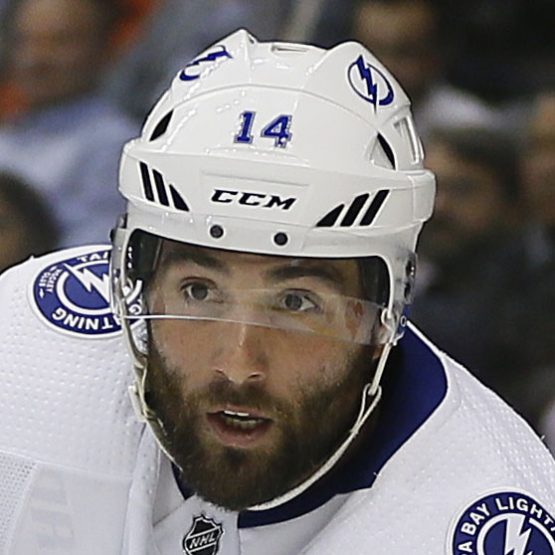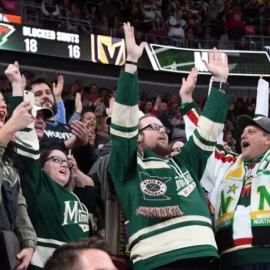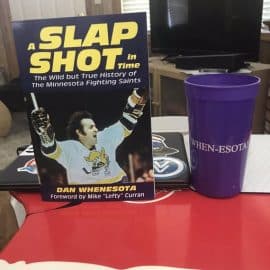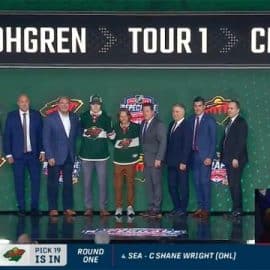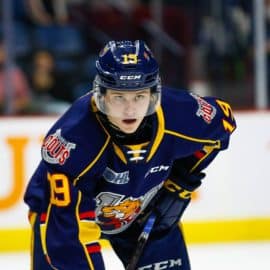The minor leagues. When someone hears that term they think of long bus rides, and crappy locker rooms and motels. For hockey fans, the movie Slap Shot also comes to mind, where you think about an increase in fights, strange promotion attempts (the fashion show scene here), and sparse crowds. For the players its tough because no kid grows up with the hopes of playing in the minor leagues. Yet, the minors are a key place for players to develop and hone their game and not just at the American Hockey League level anymore. A step below the AHL is the East Coast Hockey League, and if the AHL is like ‘AAA’ than the ECHL is ‘AA’. However, more and more players first established themselves in the ECHL before getting that chance to do so again at the AHL level and eventually at the NHL level. NHL players like Washington Capitals’ (and Blaine, MN-native) Matt Hendricks, hated Vancouver sniper and pest Alexandre Burrows as well as former Wild forward Andrew Brunette just to name a few all got their start in the ECHL. Every NHL team affiliates themselves with a team from the American Hockey League and most of the league teams carry an affiliation with an ECHL club. The league started in 1988 and included just 5 teams and since then has grown to include 20 teams all across the United States. In fact, the East Coast part of the league’s name is a bit deceptive now since almost half of the league are clubs west of the Mississippi River, in cities such as Ontario (California), Bakersfield, Stockton, Las Vegas, Salt Lake City, Boise, Anchorage, and Windsor (Colorado). The Wild announced Thursday their ECHL affiliation with the Orlando Solar Bears. The affiliation is not just a selection by the Wild but a mutual choice between the two organizations. Solar Bears’ Chief Operating Officer Peter Ohrablo was pretty blunt in saying why the Solar Bears wanted to affiliate with the Wild, “We want to win. We strongly believe that affiliating with the Wild organization will provide us with a solid core of players from which we can build a competitive and exciting team for our fans.”

Ohrablo’s comments are nothing unexpected. I mean honestly, would any exec who wanted to keep their job say, “we want to lose.” Of course not. Yet taking Ohrablo at his word its good to see another organization outside of Minnesota believes the franchise has a bright future on the ice. Perhaps no organization is probably more relieved than the Houston Aeros, the Wild owned-AHL affiliate. Like the Wild were in 2000, the Solar Bears are an expansion team and have yet to play an ECHL team but that fresh start is what Minnesota and Houston are hoping will be the perfect combination as Orlando plays a part in the development of the Wild’s and Aeros’ future players. 2011-12 was a rough year injury-wise which not only put tremendous strain on the Wild in the sheer amount of call ups (47 different players donned a Wild uniform this last season alone) but also on the Aeros who found themselves raiding various ECHL teams to fill out their roster. The Aeros had to call up 19 different ECHL’ers throughout the course of the 2011-12 season which gives you an idea how the troubles of one club trickles down to the farm team, etc. So why else is it important for the Wild to have an ECHL affiliate?
Click on “Read More” for the rest of the article…
1. The Wild are drafting better, which means you want more ice time for your young players: A player going to the minors would rather be in the AHL versus the ECHL but with the Wild being better at the draft people means there is a logjam of prospects (rated #7 in the Hockey News‘ Future Watch issue). Houston wants to win too as do the Solar Bears so they will be giving some roster spots to league veterans who they know can carry a good portion of the load, but for development purposes having a skilled Top 6 type player log 4th line minutes with the Aeros is a waste. That player could be much better served playing on the 1st or 2nd line in Orlando where he could get the ice time necessary to hone his game, not to mention time on special teams which will improve their versatility. A good example of this is current Wild prospect and Aeros forward Joel Broda. Broda was signed as a free agent out of major junior and sort of was the odd-man out in Houston for ice time and instead of languishing on the 4th line the team sent him to play for the Bakersfield Condors (who was the Wild affiliate at the time) and he got prime minutes and found his game at the pro level. Broda came back and had a much better year with the Aeros this season. Another good example is goaltender Darcy Kuemper. Before Dennis Endras (who is playing quite well in the World Championships for Germany by the way) left to play in Finland for HIFK Helsinki, Kuemper found himself to be the odd man out and he was dispatched to play for the Ontario Reign where he was absolutely fantastic. As injuries mounted Kuemper was called up to Houston and provided quality starts, but its impossible to deny the fact he had already had some good pro experience in the ECHL first. With the Wild about to sign Swedish-born netminder Johan Gustafsson the crease will be that much more crowded and its quite likely that one of the Solar Bears’ goaltenders (if not their starter) will be a Wild prospect. This is a good problem to have and while it may hurt these players egos a bit in the short term, they will benefit in the long run.


2. The Solar Bears will be playing a system identical to the Aeros and the Wild: While the call ups to the Wild was not able to sustain Minnesota’s playoff hopes in an injury-riddled 2011-12 season, one thing that was noticeable is that the call ups looked considerably more comfortable than in previous seasons where they looked like a fish out of water. With the Solar Bears new regime implementing the same system as the Aeros and Wild it will only help to make that adjustment that much smoother where the player can simply focus on learning to adapt to the increased speed of the game as opposed to learning a new style of hockey.
3. The Solar Bears’ location makes travel of call ups simple and more expedient: When a player goes down to injury, it can really put teams in a bind especially when you have a game the following evening which happens a lot at the minor league level who often package games heavily on the weekends. Flights from Orlando to Houston are daily which should (in theory) make it fairly easy to call up a player if the need arises.
One less official perk of this affiliation is the cool jersey and logo the Solar Bears have which has already earned some props from the Hockey News who featured it in their Jersey Hound section in their May 14th issue. Were the Wild looking at the bear wearing the sunglasses and thinking about our hefty crop of quality prospects and thinking the ‘future is so bright, we have to wear shades’? The organization and Wild fans certainly hope so!
Add The Sports Daily to your Google News Feed!


